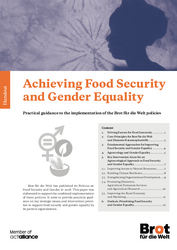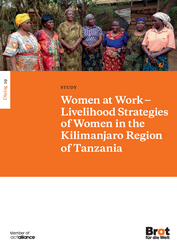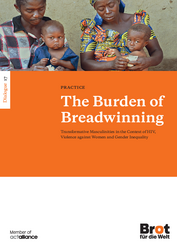
Escaping Hunger and Poverty through Gender Equality
Women and girls in the Global South are often at a tremendous disadvantage, a fact especially evident in the hunger and poverty which predominantly affect women. Equal rights are an effective means to counter this injustice, as studies demonstrate.
Gender Inequality has many Faces
The disadvantages faced by women and girls are manifold. Of the two billion malnourished people in the world, 1.4 billion are female. Women worldwide usually earn significantly less than men for the same work. Maternal mortality is unnecessarily high, girls have fewer educational opportunities than boys, and inheritance laws almost everywhere discriminate against daughters and wives. In addition, women and girls suffer from widespread gender-based and sexualized violence. Brot für die Welt (Bread for the World) wants to change all that. This is possible because gender relations are not static: They change in accordance to economic, social and societal developments. That is equally true in both the Global North and South.
Assert Human and Women's Rights
Gender equality is a human right and one of the Sustainable Development Goals of the United Nations. Its effects would be significant. A study by the FAO (PDF) [3.3 MB] states: “If women had the same access to productive resources as men, they could increase yields on their farms by 20 to 30 percent. This could raise total agricultural output in developing countries by 2.5 to 4 percent, which could in turn reduce the number of hungry people in the world by 12 to 17 percent.”
Self-confident, committed women and men who participate in social, economic and political decisions contribute to achieving such changes. Thus, patriarchal power structures and related ways of thinking and behaving still prevalent in most societies must be dismantled and changed. Such change also includes all people who are discriminated against or persecuted because of their sexual orientation or gender identity. Women and men must play an active part in this emancipation process, and it must also be directed toward young people.
What Brot für die Welt Does
Together with our partner organisations we are committed that all people, regardless of gender identity, enjoy the same rights and opportunities. We regard people who suffer gender discrimination not only as victims, but also as a potent force in the commitment to a just world. All projects - from improving agricultural practices to promoting democracy - are aimed at narrowing and ultimately closing the gender gap. We support our partner organisations in joining networks and establishing contacts with gender experts in order to develop and strengthen their gender work further. We are also committed to ensuring that the German Federal Government takes a stronger stand on gender issues in development cooperation.
Download





